On Thursday, 17 October 2013 Mongabay.com and the Roundtable on Sustainable Palm Oil (RSPO) co-hosted a discussion on environmental issues related to palm oil. The discussion involved representatives from WWF, Greenpeace and the RSPO. Mongabay.com Founder Rhett A. Butler served as the moderator.
The following is an approximate transcription of the discussion. The transcription was provided by the RSPO.
Rhett Butler: Welcome to the online debate, I am Rhett Butler to moderate this discussion on deforestation and palm oil. I am joined by Darrel Webber, RSPO’s Secretary General, Adam Harrison, Vice-President of the RSPO Executive Board and Senior Policy Officer, Food and Agriculture, WWF and Bustar Maitar, Head of Global Network of Indonesia Forest Campaign, Greenpeace. The objective of this online debate will be to engage with the panelists in an open and honest discussion on the issue of deforestation.
The haze in South East Asia caused by forest fires on the Indonesian island of Sumatra this summer and affecting Singapore and parts of Malaysia have made international headlines and well raised a number of important questions about palm oil sustainability. The forest fires – partially caused by ‘slash and burn’ to clear land for palm oil production – are part of a bigger discussion on how to halt deforestation and move to sustainable production methods. It is of crucial importance to discuss the best way forward against deforestation. The objective will be to have an honest exchange of views which provides a broader perspective on the issues regarding palm oil’s sustainability and certification. Before we start, I will ask each of the panelists to introduce themselves.

Rainforest being cleared for an oil palm plantation in Malaysian Borneo
Adam Harrison: I am a vice president of RSPO. Our position on palm oil is to acknowledge that there are many serious negative impacts on wildlife and people; but it does not have to be that way. Palm oil can be produced sustainably and we can see some companies doing that or going beyond the RSPO standards. It is our work to make more companies do it.
Bustar Maitar: I am currently leading this discussion in Jakarta; this discussion is very important to state our position on Palm Oil and show the international audiences what Greenpeace is doing to stop deforestation. For example in Indonesia Palm Oil is one of the drivers of deforestation. As Adam has said palm oil can be grown in a sustainable way.
Darrel: I have been the RSPO Secretary General for three years now. The RSPO is a multi-stakeholder initiative trying to promote sustainable palm oil. We want to promote sustainable palm oil which is socially just, environmentally friendly and economically viable. I have high expectations for this debate. We enjoy this kind of frank discussion, as we believe it is crucial, the RSPO welcomes and rely on internal and external feedback. We understand the problem of deforestation and the RSPO can contribute to solving this problem. We have to take into account that RSPO is one of the solutions, but a global solution for deforestation cannot come without a solution to the development problem. Especially development in rainforest nations.

Palm fruit in an oil palm plantation
Rhett: Adam, what needs to be done to protect forests on the one hand, and safeguard food security for the ever-growing world population on the other hand?
Adam: Especially in regards to palm oil this is a shared responsibility. Industry has a responsibility to act responsibility and reduce GHG, fair treatment of other actors and employees, but it is not just the business that has to do it, it is also governments. Authorities which allocate land and decide on developments patterns have to step up as well. Other actors such as buyers have to step up. NGO’s have a role to play. WWF is trying to support initiatives that tackle these issues. It is about the shared responsibility. Palm oil is a good example, it is a crop that has high yielding, it is an employer for rural areas. There can be a sustainable future, it can be done in sustainable way, it can provide economic and sustainable development.
Bustar: It is a question of growing palm oil in a sustainable way, but also the growing population is something that government and authorities should take a look at. It is one of the drivers of deforestation in Indonesia and other places in the world. It does not mean though that palm oil should grow everywhere, and in forest areas. We should maintain the livelihood of the population, not only in regards to economy and income abut also for them to have a better place where to live in.
Rhett: Darrel do you want to add anything?
Darrel: Yes just to see where the RSPO fits in in all this. In terms of food security, this means increasing access to food for a larger population. Rspo talks a lot about increasing yield and this is a way to tackle the food security issue. To focus on yield and not expansion, and if there is the need to expand, one should do it with the free prior informed consent of the communities involved.

An oil palm plantation in Malaysian Borneo
Rhett: Why are some companies and NGOs making the move to go beyond RSPO standards and what does this mean for the transformation of the entire industry?
Bustar: We have been sending a letter to more than one hundred companies, most of which are RSPO members. In 2007, we did the same thing of sending letters to palm oil companies. And what is really surprising is that 80% just replied saying: “We are RSPO members”. The question is “so what? Many companies are hiding behind the RSPO name and this is not good also for the RSPO itself. Many people put a lot of expectation on the RSPO. I refer to what is happing on the ground, in 2007 we released the 1st report on the RSPO, highlighting United Plantations, one of the first companies getting RSPO certified and we found that this company was clearing forests in Kalimantan. If we follow what the whole supply chain is doing, such as local companies like Wilmar, this is the issue. RSPO just recently took a decision to remove Duta Palma but the problem has been around for a long time. People are just hiding behind the RSPO label and behaving differently on the ground.
Adam: In many ways I agree with Bustar. It is no longer enough to be a member of the RSPO and also other actors of the supply chain have to move the supply chain to green instead of just hiding behind the RSPO. This is why we are doing things such as the WWF Scorecard to report on this progress. There are companies that are doing great within the RSPO. The RSPO could be better, we need a heavier stick for those who are lagging behind. There is a lot of debate about the standards of the RSPO which is really healthy as it challenges the organization.
Darrel: Let’s start with the statement made by Bustar that companies are hiding and Adam saying that there are other members in the RSPO other than just growers. Being a member does not account for much. Whether you are certified or you buy certified production – it is what counts. I am always preaching: you can’t push the supply chain, you can pull it. The issue today is not the production of CSPO, we have more than enough. The issue today is the uptake that is a problem, improve this and you will reach more visibility. I am happy to read the Greenpeace report. They do acknowledge that the RSPO is a benchmark, that RSPO is a basis. And we always rely on the external and internal feedback to improve. These new groups are great examples to other members to see how innovation can be done.

Oil palm plantation in Borneo
Rhett: Are you referring to the POIG (Palm Oil Innovation Group)? Can someone explain that a bit more?
Bustar: When Greenpeace started forest campaigning using palm oil as key topic, it realized that all actors of the supply chain bear responsibility. It is also the role of customers to make it happen. We start with market companies and challenge them to look at the supply chain. After several years, I am speaking directly with a producer, and he says it is impossible to reach a zero deforestation commitment. I believe it is still possible and Golden Agri made this commitment and it is also a proof that growing palm oil without peat lands and forests destruction is possible.
We have been talking to New Britain Palm Oil and AgroPalma, not everything is good but there are things that other companies can follow. This is why we came with this group. It focuses on the growers; all of members of POIG are RSPO members except Greenpeace. All companies agree that the basis of this is the RSPO. But we want to create a stronger platform. WWF and RAN are joining; we only have
4 grower companies at the moment.
Adam: I would like to add that growers are there as individuals of POIG. We do not see any conflict with this and being RSPO members. It is healthy to have a venue whereby these innovators can show what it is possible for the industry to be and feed it back to the RSPO. It is a part of the broader spectrum of actions towards more sustainability. It is healthy and it is pushing people to improve.
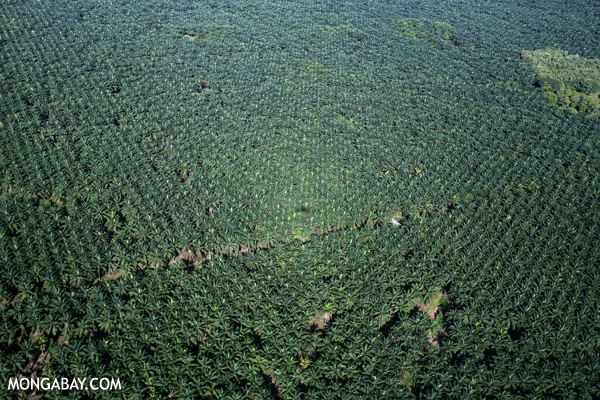
An oil palm plantation in Latin America
Rhett: Darrel mentioned the need to pull supply. Is there a demand for CSPO from emerging markets
(China, Pakistan, India, Indonesia…)?
Adam: We are working hard in China, India and Indonesia which are biggest consumers of palm oil, each one consuming more of the EU. We see the first demand. In Indonesia they are selling cooking oil produced from sustainable palm oil, that is a fantastic move. We are encouraging other companies, multinationals to take a lead on that. We urge to sell it to emerging markets, not just to European clients. We see more sustainability awareness in emerging markets. People, multinationals and nationals have to be encouraged to do that. There is a lot of opportunity and people have to put pressure to make them react on these opportunities.
Darrel: I have heard this a lot of times and I get a little bit worried when people come with this question because I see where it comes from: China and India are so large so why even bother? But we have to take it step by step. We need Europe, the US, Oceania and South East Asia to move; and if all these markets move, then China and India will also move. It gives us an excuse not to move, if China doesn’t do it. As it happened in the global deal. We should get Europe and the US to supply CSPO and solve what we can now.
Bustar: I agree with Darrel, we should not use China and India as a reason for companies not to move. I know some companies who wanted to supply non CSPO to China because they did not require to do so, but then China came out and said they also wanted sustainable production, because whatever the process in China, than that market is still selling to US and Europe. I think whatever we can do, we have to do it. It is not about bartering. We have to protect forests and the environment and there is plenty of room for improvement. We should not use China and India as an excuse.
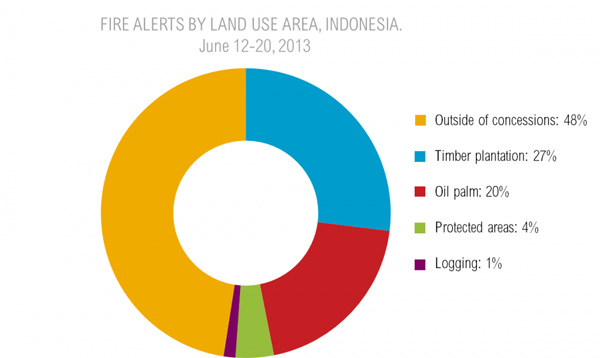
WRI analysis showing fire hotspot alerts by land use in Sumatra, June 2013.
Rhett: Bustar, Greenpeace has been highly critical on the RSPO fires. Could you and Darrel talk about the role of RSPO members in the fires?
Bustar: When I speak to people and journalists, it is clear that the fire has been a longstanding problem in Indonesia. Sumatra is a land of peatland and draining peatland during dry season is preparing fuel for the forest fire. We have to maintain the integrity of peatland, and stop using peatlands. Stopping the fire is not easy, the Indonesian government has started having measures to stop the fire, but it important to deal with the problem for the long term, stop clearing peatland and stopping convert forest. RSPO members should dedicate efforts on that.
Darrel: The haze has become topical this year because the smoke was directed to certain countries by the winds blowing in a certain direction. But the fires have been a problem for decades. This crisis constituted an excellent opportunity to understand what is behind the story. It was so heavily politicized, and we were looking to find out what the truth was. We went there and investigated 12 names that were in the press; 8 of them were RSPO members, 7 were cleared and one was identified having systemic problems. That is dealing with the specifics, but what is the issue there? The issue now is that the maps are not in agreement with one another. They do not match. We went to RSPO members and proved the legality of the maps with them; we are the only organization which has these maps publicly available since August on the website “eyes on the haze” and you will see all certified plantations and see the hotspots, and where they originated. We are the only one doing this publicly. We still have a long way to go. We want to work with the Indonesian government, the Indonesian government is coming up with a great initiative, the “OneMap” Initiative – a single map initiative in Indonesia is crucial to understand where the truth lies, and this should be pushed to move faster.
Adam: This debate shows that because of a lack of transparency it is difficult to find out who is behind the fires. I think that acknowledging this transparency is a welcome move but we have to address more systemic problems – such as allocation of land, sourcing of Fresh Fruit Bunches etc. It is not done properly. Although some companies do not have hotspots they may still be processing fruits from plantations without any fire policy. Not only related to the haze but also for example in buying FFB from illegal land. It is a systemic problem and we need to clean it up.
Bustar: I would like to say something about maps. We congratulate RSPO to publish these maps and create this site. When we started to point finger, what we were saying is that there are hotspots in your concessions, please check. Transparency is related to maps: Greenpeace is using the best available information in the public domain. When we ask companies to provide maps, they do not share it with us. The summer haze created a momentum for companies to share information about maps. A lot of RSPO members are trading palm oil and buying palm oil from companies responsible for fires. This is something that all RSPO members should deal with.
Darrel: I would like to say that regarding maps and transparency, the vast majority of plantations in Indonesia are not RSPO members. There are in reality 9.2 million hectares of Oil Palm plantations in Indonesia. If you want to increase visibility, reduce this gap. Stakeholders have to act about it. We can’t provide that visibility. Regarding tracing sources of fresh fruit bunches, it is indeed a problem and it was discussed at length during the RSPO standards review. To the credit of the working group there is now a solution. There is an indicator in the new RSPO P&C 2013, the mill has to know the origin of the oil. There is recognition of the problem and there is a solution. I think we are on the road to solving this problem.
Bustar: If we want to solve forest fires, what needs to happen is that RSPO should ask all its members not to develop on peat lands and forests, this is crucial.

An excavator creates a canal in Riau Province, Indonesia, despite the heavy smoke caused by the forest fires. © Ulet Ifansasti / Greenpeace
Rhett: There is one member who is having problems with fire management. So can RSPO enforce compliance? There are several questions from the audience about this. Can the RSPO have any legal power?
Darrel: The rules of RSPO is very clear: no open burning. We have auditors going to the ground to check. If you have done open burning, you cannot become certified. We also have a complaints system. The ultimate sanction is to ask the member to leave. But we think it is the last thing that you should do. If you want to create change you have to guide change. We want them to change and to guide them towards change instead of expelling and doing nothing. We want to see net positive change on the ground. In all complaints we have looked at so far, both parties were right and both parties were wrong at the same time. Every complaint is handled here; it takes a long time to understand what the reality on the ground is. And then we decide how to move on.
Bustar: Every time a big peatland is transformed into plantations, I believe that there will be fire coming. Why? Because draining peatland is the same as preparing fuel for forest fires. This is something that is really important to address. Informing stakeholders and local communities in case there is any problem on the ground is very important. If there is no NGO, there is no way locals can communicate the problem. Many plantations are in remote areas with little communication. RSPO should enable people in remote areas to monitor what is happening on the ground.

Rainforest and oil palm in Costa Rica
Rhett: How do people in small communities report complaints?
Bustar: In our experience, when the RSPO organizes a meeting, the needs of local communities are usually represented by NGOs. If the NGO is a part of RSPO it is their duty to do so. In many cases complaints are recorded by NGOs and submitted to RSPO. However, there is a need to create a platform where communities could communicate directly with the RSPO. The RSPO does not have enough capacity to address the issue. RSPO is relying on certification bodies.
Adam: At the end of the day the RSPO is a voluntary body and so we need incentives to make people progress in their commitments. I agree with Bustar, we need a stick and make the process swifter and harsher punishments. Most of complaints come from plantations that are not yet certified. It is no longer enough to be a member of the RSPO. What is more important is to get certified and achieve progress.
Rhett: What is your penalty then?
Adam: A few years ago it was enough for companies to say that they are buying palm oil from the RSPO members. Now it is important to buy certified sustainable palm oil from the RSPO members. We need to continue ramp up that pressure on the buyers.
Darrel: We have to be aware that when a company wants to become certified, its whole management process has to be scrutinised. And it is why sometimes in this cases the complaint reates is higher than in other cases. We also need to take a look at the success rates. Most of complaints come from uncertified plantations. Half of the compliance cases that come through to the RSPO are closed which is a good sign. What about the other half, you would ask? If you look at the complexity of the cases and if you look at the other bodies resolving similar cases, this is a very good success rate. We have had success but we still have a long way to go. When a company chooses certification, we evaluate the way company operates, whether it is working with local communities, keeping a log and solving the complaints. The complaint system of the RSPO is the way for these communities to have this recourse.

Rainforest and oil palm in Borneo
Rhett: Are you proposing to expand the RSPO membership?
Darrel: I am proposing to expand certification among members. And the way to do it is to pull the supply chain; right now the chain is being pushed.
Rhett: We have some questions from the audiences as to whether the RSPO standard can become compulsory. We know of course that it is not possible but how about other standards, the Malaysian Sustainable Palm Oil (MSPO) Malaysian CSPO etc.? There are also rumors that some RSPO members may pull out of the RSPO and join other standard schemes? What would be the consequences of that?
Darrel: I think it is a good sign because our objective is to raise the bar within the industry and appearance of such new standard is a clear sign that this is happening. What can be a negative consequence is some confusion on the market because of many different standards. But at the end of the day we have to focus on our unique selling proposition and let the market decide. We are a multi- stakeholder platform, it is our strong point, we have a system of auditing and monitoring in place. If we are credible in the eyes of the market, we have nothing to fear.
Adam: I agree with that. The RSPO’s success is in its idea of many different stakeholders. But what is more important to that the RSPO seeks to create a completely sustainable supply chain which does not exist in some other schemes (Indonesian scheme, for example). It is a good thing that more standards are appearing and if some countries propose to make these standards compulsory, for example Indonesia, it is even better as it shows to the industry that companies have to proceed to meet these standards and then go beyond the legal compliance. These standards are filling different niches.

Oil palm development in Borneo
Rhett: If the Malaysian palm oil standard leads RSPO members to leave, shouldn’t Greenpeace support the RSPO for its members not to leave towards weaker standards?
Bustar: What we really stand for is to try to eliminate deforestation. As long as all these standards can prevent deforestation, we are happy with them. Whatever the certification scheme is, it has to address deforestation. It is also an opportunity for the RSPO to become stronger and get rid of the members that are there only for the name of the RSPO and embrace progressive companies. But any standard has to address deforestation, otherwise the standard is weak.
Rhett: Is a market premium for CSPO a good enough initiative for producers? Are there any benefits for producers except for premium?
Bustar: I have talked to companies and most say there is very little premium. The market should appreciate the efforts which companies make to become sustainable. The appreciation should come with a premium price. What we are trying to find is the balance between ecology and economic growth.
Adam: We interviewed some RSPO members about the costs and benefits of being RSPO-certified and they pointed out some advantages: being required to become sustainable allows them to develop more efficient management practices. They can also reduce the costs and increase yield by implementing more efficient practices. The biggest single area for cost saving identified by RSPO members is having more structured way of engaging with local communities whereby you can reduce the number of disputes with local communities which costs money. At the end of the day RSPO makes sense to growers in terms of economic benefits, it is a win-win situation. We need to get this message out to the wider industry that is not yet involved in certification.
Darrel: People sometimes forget that we regularly review our standards. We talked about avoiding primary forests. With new standards that we agreed upon earlier this year we have now set a threshold taking into account high carbon stock areas and we have to avoid high carbon stock areas. We are a global standard and high carbon stock areas will vary from country to country based on national standards. We have a working group also with NGOs which will examine the issue and come up with a solution to zero deforestation.

Oil palm plantation in Sumatra
Rhett: There is another recurring question from the audience. Can we set aside high conservation value areas for conservation and can oil palm plantations be done mostly in already deforested or very degraded non-forest areas? Are there any regulations on the impact of replanting to biodiversity? How do you incentivize biodiversity?
Darrel: On replanting – a good plantation company will not replant the whole plantation. It should not be done that way. RSPO certified members do set aside high conservation areas, consistently from 10 to 40% of their concessions. How do we incentivize them? The market should incentivize them by buying CSPO. Biobanking is being discussed in some working groups within the RSPO and it could be a solution as well.
Adam: I would like to remind people that Darrel is right and the RSPO requires members to avoid planting on HCV areas or even areas that help maintaining those HCV areas. It is a question of whether the member company is doing what it has signed up for. The market has to incentivize, NGOs have to monitor the companies’ performance and the RSPO has to enforce its rules.
Bustar: At the beginning I stated very clearly that palm oil is important to Indonesia and the position of Greenpeace is not anti-palmoil. We cannot stop existing plantations for these to become forests because we need to be fair with the people on the ground. The RSPO is already helping to monitor the situation but the question is how companies really implement the rules on the ground. Greenpeace has not really focused on replanting but more on expansion.

Oil palm plantation in Sabah, Malaysia
Rhett: Can RSPO work with NGOs and industry to develop promising practices for biodiversity offsets and the integration of agroforestry/agrobiodiversity and non-food biodiversity within and between oil palm operations to enhance food security and ecosystem values?
Bustar: For us in Greenpeace offset for the past deforestation can be done, but not for future deforestation.
Adam: Yes, also the RSPO agrees no future offset should be done, we should not be seeing irresponsible forest clearance happening. There have been problems of deforestation in the past and we should offset. We need to address it, biobanking could be a solution. I would rather have all RSPO members enforcing and implementing the rules than trying to find ways to mock up mistakes later. The RSPO has a number of NGOs members which are interested in ways for the industry to improve. WWF has done a lot of work, and lots of help is coming from the NGO as regards mapping and manage expansion. The NGO community is very active within the RSPO and looking for responsible member in the RSPO to work with.
Rhett: Is the RSPO incentivizing the intensification of production? Or less intensive more expansive plantation that intercrop with other products or livestock, are there different approaches?
Darrel: Any innovation is possible in the RSPO; it only depends on the consensus between members. I think so far the consensus is to avoid land grabbing from local communities and avoid high conservation areas. We have not thought about less intensive more expansive palm oil, there is no consensus yet on that within the RSPO. But we are happy if this is brought to the table.
Adam: It is clear for the industry that the potential yield of palm oil is much higher than what has been achieved. So it is possible to intensify existing production rather than expand production to new plantations, so we should think of ways to make it more intensive.
Bustar: Greenpeace is working closely with local smallholders which want to develop palm oil but protect their communities at the same time. Using palm oil plantations for the animal feedstock could be a good idea. Greenpeace has been working on this with Smallholders in Riau. Increasing yield can be a good idea too, smallholders yield is usually very low. There is a potential there to increase the yield. It really depends on us which way to go. It is also important to define degraded land and work on developing on degraded forest with Carbon Stock assessments and studies. It really depends on us on what way we would like to go.

Oil palm plantation on peatland in Indonesian Borneo
Rhett: How do you deal with governments? Government knows the bad effects of planting oil palm on peat land, but they still convert forest for plantation. If a company gets a concession in forest area but that violates RSPO criteria, what happens?
Darrel: RSPO rules go beyond national laws and what countries require of course without contradicting the law. Regardless of the national law, an RSPO member have to respect the RSPO rules, i.e. avoid primary forest, avoid high conservation areas, high carbon stock areas and obtain a permission from local communities with free prior informed consent etc.
Adam: The RSPO needs to engage with policy makers in Indonesia on identifying HCV areas and whether they recognized under national rules. Companies take initiative but the RSPO needs to be involved to align policies.
Bustar: The role of the company is the most important. I know what the regulations in Indonesia are and I know about the lack of governance, rampant corruption in the country. But the companies which want to have a sustainable business should not take advantage of weak rules in the country and should avoid bad practices.

Oil palm plantation on peatland in Indonesian Borneo
Rhett: How can consumers help address this problem? How can we make food labels accurate?
Adam: First they have to look for products which have the RSPO logo. Individuals have a power to contact brands and retailers and ask that what brands are doing to source sustainable palm oil. It is a real power and they have to demand that companies buy CSPO.
Bustar: The role of customers is important: there is no free CSPO, they should spend extra money to purchase goods made from sustainable palm oil in order to help producers grow CSPO. It is also important not to scare people with bad messages on palm oil. It is important to keep the awareness high out there.
Darrel: Consumers have to remember that the answer to palm oil is only sustainable palm oil. “No palm oil” at all is not an option. Many people do not know that by removing palm oil from the market you will only drive deforestation. There is a solution to unsustainable palm oil but it is in the hands of the consumer – you can also ask your retailer, your manufacture whether they source CSPO. Let’s not waste this momentum, let’s not wait for a perfect solution. We have to act now.
Rhett: Thank you everyone for this interesting debate.
Related articles
Palm oil now biggest cause of deforestation in Indonesia

(09/03/2013) Conversion of forests for palm oil production now appears to be the single largest driver of deforestation in Indonesia, accounting for roughly a quarter of forest loss between 2009 and 2011, asserts a new Greenpeace report that accuses the sector’s main certification standard of failing to stop forest destruction. The report, titled Certifying Destruction, uses satellite imagery, government concession data, field investigations, and third party analysis to conclude that several recent and current members of the Roundtable on Sustainable Palm Oil (RSPO) — the industry’s chief eco-certification body — are continuing to buy or trade palm oil produced via the conversion of rainforests and carbon-dense peatlands in the Southeast Asian nation.
Palm oil body, Greenpeace spar over Indonesia fire blame
(07/16/2013) Greenpeace and the Roundtable on Sustainable Palm Oil (RSPO), a body that sets criteria for greener palm oil production, are caught up in a row over the origin of fires that cast a pall over Sumatra, Singapore, and Malaysia last month. The dispute started when media outlets, based on independent analysis of satellite data, identified several members of the RSPO as possible culprits in the fires in Riau Province. Greenpeace said the findings indicated that the RSPO is failing to hold its members accountable for burning. The activist group also criticized the RSPO for not expressly prohibiting deforestation and conversion of peatlands.
Environmentalists unhappy with new palm oil standard

(04/25/2013) Environmentalists are unhappy with Thursday’s approval of new criteria for the world’s leading palm oil certification standard. After members of the Roundtable on Sustainable Palm Oil (RSPO) in a special assembly approved the body’s new ‘principles and criteria’ (P&Cs) for palm oil certification, several groups voiced concern that the rules won’t protect against conversion of carbon-dense rainforests and peatlands for oil palm plantations.
Cutting through the rhetoric on palm oil production

(12/14/2012) Palm oil is widely acknowledged as one of the most important drivers of deforestation and forest diminishment in Southeast Asia. Conversion of forests and peatlands for oil palm plantations is both a substantial source of greenhouse gas emissions and a major threat to biodiversity — one study called palm oil the ‘single most immediate threat to the greatest number of species’.
Roundtable on Sustainable Palm Oil hits 10 year mark
(10/04/2012) The Roundtable on Sustainable Palm Oil (RSPO) is holding its tenth annual meeting later this month. The initiative, which aims to improve the social and environmental performance of palm oil production through a certification standard, has advanced considerably during that time, moving from an idea to a reality: RSPO-certified palm oil now accounts for 12 percent of global palm oil production. Yet the RSPO is not without controversy. Some palm oil companies say its criteria are too costly to adopt and are therefore discriminatory, while environmental critics argue its bar for “sustainable” palm oil is too low and the loopholes allow producers to claim membership even if they aren’t actually producing certified palm oil across all their holdings. Nonetheless the RSPO has support from many of the world’s largest palm oil producers, traders, and consumers as well as the biggest NGOs.
Our success in transforming commodity markets will determine nature’s fate

(04/01/2012) The success of governments and big corporations in eliminating environmental degradation from the products we consume will play a critical role in determining the fate of the world’s remaining wild places, said a group of experts speaking at a panel during the Skoll World Forum on Social Entrepreneurship.
After protracted campaign, Girl Scouts pledges to cut out some palm oil

(10/02/2011) Girl Scouts USA has announced that it will lessen palm oil in its ubiquitous cookies by using alternatives when possible and cutting overall usage. The organization also committed to purchasing GreenPalm certificates for all of its palm oil in order to financially support more environmentally sustainable palm oil, even if the palm oil in the cookies is not.
Could palm oil help save the Amazon?
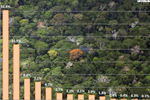
(06/14/2011) For years now, environmentalists have become accustomed to associating palm oil with large-scale destruction of rainforests across Malaysia and Indonesia. Campaigners have linked palm oil-containing products like Girl Scout cookies and soap products to smoldering peatlands and dead orangutans. Now with Brazil announcing plans to dramatically scale-up palm oil production in the Amazon, could the same fate befall Earth’s largest rainforest? With this potential there is a frenzy of activity in the Brazilian palm oil sector. Yet there is a conspicuous lack of hand wringing by environmentalists in the Amazon. The reason: done right, oil palm could emerge as a key component in the effort to save the Amazon rainforest. Responsible production there could even force changes in other parts of the world.
Breakthrough? Controversial palm oil company signs rainforest pact

(02/09/2011) One of the world’s highest profile and most controversial palm oil companies, Golden Agri-Resources Limited (GAR), has signed an agreement committing it to protect tropical forests and peatlands in Indonesia. The deal—signed with The Forest Trust, an environmental group that works with companies to improve their supply chains—could have significant ramifications for how palm oil is produced in the country, which is the world’s largest producer of palm oil.
Greening the world with palm oil?
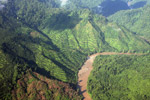
(01/26/2011) The commercial shows a typical office setting. A worker sits drearily at a desk, shredding papers and watching minutes tick by on the clock. When his break comes, he takes out a Nestle KitKat bar. As he tears into the package, the viewer, but not the office worker, notices something is amiss—what should be chocolate has been replaced by the dark hairy finger of an orangutan. With the jarring crunch of teeth breaking through bone, the worker bites into the ‘bar’. Drops of blood fall on the keyboard and run down his face. His officemates stare, horrified. The advertisement cuts to a solitary tree standing amid a deforested landscape. A chainsaw whines. The message: Palm oil—an ingredient in many Nestle products—is killing orangutans by destroying their habitat, the rainforests of Borneo and Sumatra.
Converting palm oil companies from forest destroyers into forest protectors
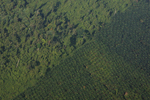
(01/02/2011) In efforts to save the world’s remaining rainforests great hopes have been pinned on “degraded lands” — deforested lands that are presently sitting idle in tropical countries. Optimists say shifting agriculture to such lands will help humanity produce enough food to meet growing demand without sacrificing forests and biodiversity and exacerbating social conflict. But to date, degraded lands remain an enigma, especially in Indonesia, where deforestation continues at a rapid pace. Degraded lands are often misclassified by various Indonesian ministries—land in a far-off province may be listed as “wasteland” by Jakarta, but in reality is blanked by verdant forest that sequesters carbon, houses wildlife, and affords communities with food, water, and other essentials. Granting logging and plantation concessions on these lands can result in conflict and environmental degradation.

(07/29/2010) Many of the environmental issues facing Indonesia are embodied in the plight of the orangutan, the red ape that inhabits the islands of Borneo and Sumatra. Orangutan populations have plummeted over the past century, a result of hunting, habitat loss, the pet trade, and human-ape conflict. Accordingly, governments, charities, and concerned individuals have ploughed tens of millions of dollars into orangutan conservation, but have little to show in terms of slowing or reversing the decline. The same can be said about forest conservation in Indonesia: while massive amounts of money have been put toward protecting and sustainable using forests, the sum is dwarfed by the returns from converting forests into timber, rice, paper, and palm oil. So orangutans—and forests—continue to lose out to economic development, at least as conventionally pursued. Poor governance means that even when well-intentioned measures are in place, they are often undermined by corruption, apathy, or poorly-designed policies. So is there a future for Indonesia’s red apes and their forest home? Erik Meijaard, an ecologist who has worked in Indonesia since 1993 and is considered a world authority on orangutan populations, is cautiously optimistic, although he sees no ‘silver bullet’ solutions.
Consumers should help pay the bill for ‘greener’ palm oil

(01/12/2010) Palm oil is one of the world’s most traded and versatile agricultural commodities. It can be used as edible vegetable oil, industrial lubricant, raw material in cosmetic and skincare products and feedstock for biofuel production. Growing global demand for palm oil and the ensuing cropland expansion has been blamed for a wide range of environmental ills, including tropical deforestation, peatland degradation, biodiversity loss and CO2 emissions. In response to these concerns, a group of stakeholders—including activists, investors, producers and retailers—formed the Roundtable on Sustainable Palm Oil (RSPO) to develop a certification scheme for palm oil produced through environmentally- and socially-responsible ways. It is widely anticipated that the creation of a premium market for RSPO-certified sustainable palm oil (CSPO) would incentivize palm oil producers to improve their management practices.
Palm oil both a leading threat to orangutans and a key source of jobs in Sumatra

(09/24/2009) Of the world’s two species of orangutan, a great ape that shares 96 percent of man’s genetic makeup, the Sumatran orangutan is considerably more endangered than its cousin in Borneo. Today there are believed to be fewer than 7,000 Sumatran orangutans in the wild, a consequence of the wildlife trade, hunting, and accelerating destruction of their native forest habitat by loggers, small-scale farmers, and agribusiness. Gunung Leuser National Park in North Sumatra is one of the last strongholds for the species, serving as a refuge among paper pulp concessions and rubber and oil palm plantations. While orangutans are relatively well protected in areas around tourist centers, they are affected by poorly regulated interactions with tourists, which have increased the risk of disease and resulted in high mortality rates among infants near tourist centers like Bukit Lawang. Further, orangutans that range outside the park or live in remote areas or on its margins face conflicts with developers, including loggers, who may or may not know about the existence of the park, and plantation workers, who may kill any orangutans they encounter in the fields. Working to improve the fate of orangutans that find their way into plantations and unprotected community areas is the Orangutan Information Center (OIC), a local NGO that collaborates with the Sumatran Orangutan Society (SOS).